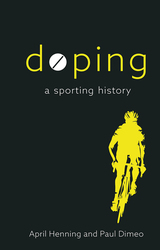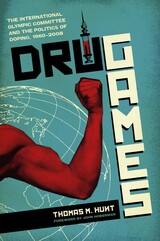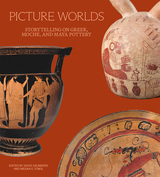
Why is doping a perennial problem for sports? Is this solely a contemporary phenomenon? And should doping always be regarded as cheating, or do today’s anti-doping measures go too far?
Drawing on case studies from the early twentieth century to the present day, Doping: A Sporting History explores why the current anti-doping system looks as it does, charting its origins to the founding of the modern Olympic Games. From interwar notions of sporting purity to the postwar stimulant crisis, what seemed an easily resolvable problem soon became an impossible challenge as the pharmacology improved, the policy system stuttered, and Cold War politics allowed doping to flourish. The late twentieth century saw the creation of the World Anti-Doping Agency, but has the intensity of these global measures led to unintended harms?
From the cyclist Tommy Simpson who died in 1967 on Mont Ventoux with amphetamines in his jersey to Team Russia’s expulsion from the 2018 Winter Olympics, Doping: A Sporting History is a gripping, provocative account that ultimately proposes a new approach: one for the inclusion and protection of athletes themselves.

On August 26, 1960, twenty-three-year-old Danish cyclist Knud Jensen, competing in that year's Rome Olympic Games, suddenly fell from his bike and fractured his skull. His death hours later led to rumors that performance-enhancing drugs were in his system. Though certainly not the first instance of doping in the Olympic Games, Jensen's death serves as the starting point for Thomas M. Hunt's thoroughly researched, chronological history of the modern relationship of doping to the Olympics. Utilizing concepts derived from international relations theory, diplomatic history, and administrative law, this work connects the issue to global political relations.
During the Cold War, national governments had little reason to support effective anti-doping controls in the Olympics. Both the United States and the Soviet Union conceptualized power in sport as a means of impressing both friends and rivals abroad. The resulting medals race motivated nations on both sides of the Iron Curtain to allow drug regulatory powers to remain with private sport authorities. Given the costs involved in testing and the repercussions of drug scandals, these authorities tried to avoid the issue whenever possible. But toward the end of the Cold War, governments became more involved in the issue of testing. Having historically been a combined scientific, ethical, and political dilemma, obstacles to the elimination of doping in the Olympics are becoming less restrained by political inertia.
READERS
Browse our collection.
PUBLISHERS
See BiblioVault's publisher services.
STUDENT SERVICES
Files for college accessibility offices.
UChicago Accessibility Resources
home | accessibility | search | about | contact us
BiblioVault ® 2001 - 2024
The University of Chicago Press









